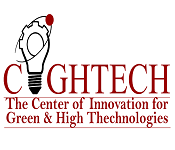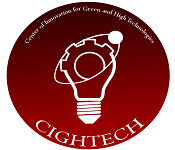Theme: Innovation in the World of Microbiology and Infectious Diseases
Microbiology Congress 2021
- About Conference
- Session and Tracks
- Market Analysis
- Past Conference Report
- Visa Application Process
- Participation Options and Benefits
The 9th Global Summit on Microbiology and Infectious Diseases 2021 will be held on November 08-09, 2021 in Vienna, Austria. Microbiology Congress 2021 is thrilled to welcome scientists, researchers, professors and delegates from all over the world to the upcoming Microbiology and Infectious Diseases Conference, which will focus on "New Trends in Microbiology and Infectious Diseases"
Microbiology Congress 2021 hosts global events each year, including conferences, workshops and symposiums in the United States, Europe and Asia-Pacific with the help of scientific societies and has already published open access journals with eminent and reputed scientists as authors.
At the Conference, a Student Poster Competition is held to inspire students and recent graduates to present their original research, which will then be published in one of our supporting international journals. Both approved abstracts will be discussed at the conference's poster sessions. For all students who are unable to attend the conference, the Conference Series offers an opportunity to display an E-Poster.
Business networking provides vendors with a platform for networking and B2B meetings with Top scientists and colleagues as well as a low-cost marketing tool for creating sales, opportunities and contacts, based on referrals and introductions made face-to-face at meetings and conferences or through other communication methods such as telephone, email, digital and increasingly social and business media.
Opportunities for Researchers and Professors
Presentations by Speakers
Display of Posters
Hosting a symposium (4-5 member team)
Organizing workshop
Universities, Societies and Associations
Proposals for collaboration between associations
Participation in Academic Partnering Groups
For Students and Scholars in Research
Competition for Posters (Winner will get Best Poster Award)
Forum for Young Researchers (YRF Award to the best presenter)
Registrations for Student Attendee Groups.
Delegates from the business world
Presentations by Speakers
The symposium will host a book launch celebration, which will provide networking opportunities.
Participation of the audience
Manufacturers of Products
Booths for exhibitors and vendors
Opportunities for sponsorship
Scientific Partnering Workshops are being organised in preparation for the launch of a new product.
Networking with clients and marketing.
SESSION-1: Antibiotic effectiveness is driven by interactions between the microbiome and the diet.
By altering surface-exposed antigens, such as O-antigens, certain gut bacterial pathogens can evade antibody-mediated defence. However, viruses can be guided to evolve towards producing O-antigen variants that impede gut colonisation by employing vaccines that target particular O-antigens to stimulate immunoglobulin A responses in the gut.
Clinical Microbiology Conferences | Applied Microbiology Conferences | Medical Microbiology Meetings | Antimicrobial Agents Conferences | Antimicrobial Resistance Conferences | Antimicrobial Agents Events
Related Societies
American Society for Microbiology | Canadian Society of Microbiologists | Society for Applied Microbiology | Society for Industrial Microbiology and Biotechnology | Swiss Society for Microbiology | Belgian Society for Microbiology | Australian Society for Microbiology | Federation of European Microbiological Societies | New Zealand Microbiological Society | South African Society for Microbiology | International Society for Microbial Ecology | Association of Microbiologists of India | Estonian Society for Microbiology | Scottish Microbiology Association | Welsh Microbiological Association | Mu Sigma Microbiology Society | Milwaukee Microbiology Society | Italian Society of Microbiology
SESSION-2:Antibiotic effectiveness is driven by interactions between the microbiome and the diet.
In a mouse model, a high-fat diet promotes dysbios is of the gut microbiota and depletion of the microbial metabolite indole-3-acetic acid, resulting in reduced antibiotic effectiveness against bacterial infections.
Microbiology and Clinical Research | Molecular Microbiology | Microbiology | Bacteriology | Microbiology and Microbes | Clinical Microbiology and Yeast Congress | Microbial Interaction and Microbial Ecology
Related Society
New Zealand Microbiological Society | South African Society for Microbiology | International Society for Microbial Ecology | Association of Microbiologists of India | Estonian Society for Microbiology | Scottish Microbiology Association | Welsh Microbiological Association | Mu Sigma Microbiology Society | Milwaukee Microbiology Society | Italian Society of Microbiology American Society for Microbiology | Canadian Society of Microbiologists | Society for Applied Microbiology | Society for Industrial Microbiology and Biotechnology | Swiss Society for Microbiology | Belgian Society for Microbiology | Australian Society for Microbiology | Federation of European Microbiological Societies
SESSION-3: Microbial Enzymes
Enzymes are thought to be a potential biocatalyst for a wide range of reactions. Microbial enzymes, in particular, have numerous applications in industry and medicine. Additionally, microbial enzymes are more active and stable than plant and animal enzymes. Furthermore, because of their biochemical diversity and susceptibility to gene manipulation, microorganisms represent an alternative source of enzymes because they can be cultured in large quantities in a short period of time via fermentation.
Microbiome,Probiotics and Gut Nutrition | Prasaitology and Microbes | Applied Microbiology And Beneficial Microbes | Cell and Tissue
Related Society
Swiss Society for Microbiology | Belgian Society for Microbiology | Australian Society for Microbiology | South African Society for Microbiology | International Society for Microbial Ecology | Association of Microbiologists of India | Estonian Society for Microbiology | Scottish Microbiology Association | Welsh Microbiological Association | Mu Sigma Microbiology Society | Milwaukee Microbiology Society
SESSION-4: Microbial Biofilms
Aggregate of microorganisms in which cells adhere to each other and/or to a surface and are frequently embedded within a self-produced matrix of extracellular polymeric substance (EPS). A biofilm is a system whose inhabitants can adapt internally to environmental conditions. Slime, or self-produced extracellular polymeric material, is a polymeric conglomeration made up of extracellular biopolymers in various structural types.
Microbiology and Clinical research | Applied Microbiology | Parasitology and Infectious diseases | Virology Summit | Medical and Clinical Microbiology
Related Society
Federation of European Microbiological Societies | New Zealand Microbiological Society | South African Society for Microbiology | American Society for Microbiology | Canadian Society of Microbiologists | Society for Applied Microbiology | Society for Industrial Microbiology and Biotechnology | Swiss Society for Microbiology | Belgian Society for Microbiology | Australian Society for Microbiology | International Society for Microbial Ecology | Association of Microbiologists of India | Estonian Society for Microbiology | Scottish Microbiology Association | Welsh Microbiological Association | Mu Sigma Microbiology Society | Milwaukee Microbiology Society | Italian Society of Microbiology
SESSION-5: Marine Microbiology
Microorganisms (bacteria, archaea, viruses, and microbial eukaryotes) in the aquatic world, including their biodiversity, ecology, and biogeochemistry, are studied in marine microbiology. The use of metagenomics in revealing the abundance and composition of marine microbial ecosystems has been crucial.
Prasaitology and Microbes | Applied Microbiology And Beneficial Microbes | Antimicrobial Agents Conferences | Antimicrobial Resistance Conferences | Antimicrobial Agents Events
Related Society
Swiss Society for Microbiology | Belgian Society for Microbiology | Australian Society for Microbiology | Federation of European Microbiological Societies | New Zealand Microbiological Society | Milwaukee Microbiology Society | Italian Society of Microbiology American Society for Microbiology | Canadian Society of Microbiologists | Society for Applied Microbiology | Society for Industrial Microbiology and Biotechnology | South African Society for Microbiology | International Society for Microbial Ecology | Association of Microbiologists of India | Estonian Society for Microbiology | Scottish Microbiology Association | Welsh Microbiological Association | Mu Sigma Microbiology Society
SESSION-6: Public Health Microbiology and Emerging Infectious Diseases
Microbial pathogenesis, public health principles, epidemiology, molecular genetics, virology, and environmental and industrial microbial processes are all included in the Public Health and Microbiology concentration. This concentration prepares students for technical work or graduate school in microbial disease systems using polymerase chain reaction and other molecular diagnostic methods, as well as environmental and industrial applications of microbial systems.
Clinical Microbiology Conferences | Applied Microbiology Conferences | Medical Microbiology Meetings | Antimicrobial Agents Conferences
Related Society
Federation of European Microbiological Societies | New Zealand Microbiological Society | South African Society for Microbiology | International Society for Microbial Ecology | Association of Microbiologists of India | Estonian Society for Microbiology | American Society for Microbiology | Canadian Society of Microbiologists | Society for Applied Microbiology | Society for Industrial Microbiology and Biotechnology | Swiss Society for Microbiology | Belgian Society for Microbiology | Australian Society for Microbiology Scottish Microbiology Association | Welsh Microbiological Association | Mu Sigma Microbiology Society | Milwaukee Microbiology Society | Italian Society of Microbiology
SESSION-7: Pharmaceutical Microbiology
Pharmaceutical Microbiology deals with the study of microorganisms that is concerned within the manufacture of prescribed drugs. Alternative aspects of pharmaceutical biological science embrace the analysis and development of anti-infective agents, the use of microorganisms in the production of pharmaceutical products such as endocrine and human human growth hormone, and hence the use of microorganisms in the production of pharmaceutical products such as endocrine and human human growth hormone.
Microbiology and Clinical Research | Molecular Microbiology | Microbiology | Bacteriology |Applied Microbiology Conferences | Medical Microbiology Meetings | Antimicrobial Agents Conferences
Related Society
Australian Society for Microbiology | Federation of European Microbiological Societies | New Zealand Microbiological Society | South African Society for Microbiology | International Society for Microbial Ecology | Association of Microbiologists of India | Estonian Society for Microbiology | Scottish Microbiology Association | Welsh Microbiological Association | Mu Sigma Microbiology Society | Milwaukee Microbiology Society| American Society for Microbiology | Canadian Society of Microbiologists | Society for Applied Microbiology | Society for Industrial Microbiology and Biotechnology | Swiss Society for Microbiology | Belgian Society for Microbiology| Italian Society of Microbiology
SESSION-8: Antimicrobial Agents and Infectious diseases
Antimicrobials are chemicals that destroy or prevent the growth of bacteria, viruses, fungi, and parasites. They are classified as antibacterials, antivirals, antifungals, and antiparasitics. Antibacterials are used to treat bacterial infections, antivirals are used t o treat viruses, and antifungals and antiparasitics are used to treat fungi and parasites, respectively.
Applied Microbiology And Beneficial Microbes | Antimicrobial Agents Conferences | Antimicrobial Resistance Conferences | Prasaitology and Microbes | Applied Microbiology And Beneficial Microbes
Related Society
South African Society for Microbiology | International Society for Microbial Ecology | Association of Microbiologists of India | American Society for Microbiology | Canadian Society of Microbiologists | Society for Applied Microbiology | Society for Industrial Microbiology and Biotechnology (SIMB) | Swiss Society for Microbiology | New Zealand Microbiological Society | Estonian Society for Microbiology | Scottish Microbiology Association | Welsh Microbiological Association | Mu Sigma Microbiology Society | Milwaukee Microbiology Society | Italian Society of Microbiology | Belgian Society for Microbiology | Australian Society for Microbiology | Federation of European Microbiological Societies
SESSION-9: Agricultural Microbiology
Plant-associated microbes are the subject of agricultural microbiology research. Its aim is to solve issues in agricultural practises that are typically caused by a lack of biodiversity in microbial communities. Understanding microbial strains that are important to agricultural applications can help improve things like soil nutrients, plant-pathogen tolerance, crop robustness.
Applied Microbiology | Parasitology and Infectious diseases | Virology Summit | Medical and Clinical Microbiology | Applied Microbiology And Beneficial Microbes | Antimicrobial Agents Conferences | Antimicrobial Resistance Conferences | Prasaitology and Microbes
Related Society
International Society for Microbial Ecology | Association of Microbiologists of India | Estonian Society for Microbiology | American Society for Microbiology | Canadian Society of Microbiologists | Society for Applied Microbiology | Society for Industrial Microbiology and Biotechnology | Swiss Society for Microbiology | Belgian Society for Microbiology | Australian Society for Microbiology | Federation of European Microbiological Societies | New Zealand Microbiological Society | South African Society for Microbiology | Scottish Microbiology Association | Welsh Microbiological Association | Mu Sigma Microbiology Society | Milwaukee Microbiology Society | Italian Society of Microbiology
SESSION-10: Infection and Immunity
Immunology is a branch of science that studies the immune system, including both innate and acquired immunity, as well as laboratory techniques involving the interaction of antigens with particular antibodies. Microbiology is a branch of science that studies different microorganisms. Microbiology is the study of bacteria's structure and various physical, chemical, and biological characteristics that relate to their disease-causing potential.
Prasaitology and Microbes | Antimicrobial Agents Conferences | Applied Microbiology And Beneficial Microbes | Molecular Microbiology | Microbiology | Bacteriology |Applied Microbiology Conferences | Medical Microbiology Meetings
Related Society
Society for Industrial Microbiology and Biotechnology | Australian Society for Microbiology | Federation of European Microbiological Societies | New Zealand Microbiological Society | American Society for Microbiology | Canadian Society of Microbiologists | Society for Applied Microbiology | Swiss Society for Microbiology | Belgian Society for Microbiology | South African Society for Microbiology | International Society for Microbial Ecology | Association of Microbiologists of India | Estonian Society for Microbiology | Scottish Microbiology Association | Welsh Microbiological Association | Mu Sigma Microbiology Society | Milwaukee Microbiology Society | Italian Society of Microbiology
SESSION-11: Pathogenicity of Microbes
The tendency of an organism to cause disease is referred to as pathogenicity (ie, harm the host). The overt damage done to the host is a property of the host-pathogen relationships, and this capacity represents a genetic component of the pathogen. This innate propensity to inflict disease is absent in commensals and opportunistic pathogens. Disease is not, however, an unavoidable result of the host-pathogen relationship.
Applied Microbiology | Parasitology and Infectious diseases | Virology Summit | Medical and Clinical Microbiology | Applied Microbiology And Beneficial Microbes | Antimicrobial Agents Conferences | Antimicrobial Resistance Conferences | Prasaitology and Microbes
Related Society
Estonian Society for Microbiology | Scottish Microbiology Association | Welsh Microbiological Association | Mu Sigma Microbiology Society | Milwaukee Microbiology Society | Italian Society of Microbiology | Canadian Society of Microbiologists | Society for Applied Microbiology | Swiss Society for Microbiology | Belgian Society for Microbiology | South African Society for Microbiology | Federation of European Microbiological Societies | New Zealand Microbiological Society | American Society for Microbiology | Society for Industrial Microbiology and Biotechnology | Australian Society for Microbiology | Federation of European Microbiological Societies
SESSION-12: Microbiology Research and Advancements
Infections caused by bacteria, viruses, fungi, mycobacteria, and parasites can all be treated through rapid detection of microorganisms in clinical microbiology. Rapid detection of microorganisms in clinical samples allows for a more rapid switch from broad-spectrum to tailored antimicrobial therapy.
Molecular Microbiology | Microbiology | Prasaitology and Microbes | Antimicrobial Agents Conferences | Applied Microbiology And Beneficial Microbes | Bacteriology |Applied Microbiology Conferences | Medical Microbiology Meetings
Related Society
Society for Industrial Microbiology and Biotechnology | Australian Society for Microbiology | Federation of European Microbiological Societies | Federation of European Microbiological Societies | New Zealand Microbiological Society | American Society for Microbiology | Canadian Society of Microbiologists | Society for Applied Microbiology | Swiss Society for Microbiology | Belgian Society for Microbiology | South African Society for Microbiology | Estonian Society for Microbiology | Scottish Microbiology Association | Welsh Microbiological Association | Mu Sigma Microbiology Society | Milwaukee Microbiology Society | Italian Society of Microbiology
SESSION-13: Microbiomes
The microbiome is the genetic material of all microbes that exist on and within the human body, including bacteria, fungi, protozoa, and viruses. The total number of genes in a person's microbiome is 200 times greater than the number of genes in the human genome. It's possible that the microbiota weighs up to five pounds.
Bacteriology | Applied Microbiology Conferences | Medical Microbiology Meetings Prasaitology and Microbes | Antimicrobial Agents Conferences | Applied Microbiology And Beneficial Microbes | Molecular Microbiology | Microbiology
Related Society
Estonian Society for Microbiology | Society for Industrial Microbiology and Biotechnology | Australian Society for Microbiology | Federation of European Microbiological Societies | Scottish Microbiology Association | Welsh Microbiological Association | Federation of European Microbiological Societies | New Zealand Microbiological Society | American Society for Microbiology | Mu Sigma Microbiology Society | Canadian Society of Microbiologists | Society for Applied Microbiology | Swiss Society for Microbiology | Belgian Society for Microbiology | South African Society for Microbiology
SESSION-14: Biotechnology & Synthetic Biology
Synthetic biology is a form of biotechnology that involves the development of Synthetic biotechnology includes the manipulation of biological compounds including incorporation of synthetic aminoacids into proteins, DNA synthesis and manipulation using synthetic sequences, oligonucleotide synthesis, protein alteration using synthetic compounds etc.
Antimicrobial Agents Conferences | Applied Microbiology And Beneficial Microbes | Molecular Microbiology | Prasaitology and Microbes | Microbiology | Bacteriology |Applied Microbiology Conferences | Medical Microbiology Meetings
Related Society
Estonian Society for Microbiology | Society for Industrial Microbiology and Biotechnology | Australian Society for Microbiology | Federation of European Microbiological Societies | Canadian Society of Microbiologists | Society for Applied Microbiology |Federation of European Microbiological Societies | New Zealand Microbiological Society | American Society for Microbiology | Swiss Society for Microbiology | Belgian Society for Microbiology | South African Society for Microbiology | Scottish Microbiology Association | Welsh Microbiological Association | Mu Sigma Microbiology Society | Milwaukee Microbiology Society | Italian Society of Microbiology
SESSION-15: Environmental Microbiology
The study of the structure and physiology of microbial communities in the atmosphere is known as environmental microbiology. The study of microorganisms in the atmosphere has been revolutionised by molecular biology, which has enhanced our understanding of the structure, phylogeny, and physiology of microbial species. The scientific study of microorganisms in the atmosphere is known as environmental microbiology. Air microbiology, soil microbiology, and water microbiology are all part of this field.
Medical Microbiology Meetings | Prasaitology and Microbes | Antimicrobial Agents Conferences | Applied Microbiology And Beneficial Microbes | Molecular Microbiology | Microbiology | Bacteriology |Applied Microbiology Conferences
Related Society
Estonian Society for Microbiology | Scottish Microbiology Association | Canadian Society of Microbiologists | Society for Applied Microbiology | Society for Industrial Microbiology and Biotechnology | Australian Society for Microbiology | Federation of European Microbiological Societies | Swiss Society for Microbiology | Belgian Society for Microbiology | Federation of European Microbiological Societies | New Zealand Microbiological Society | American Society for Microbiology | South African Society for Microbiology | Welsh Microbiological Association | Mu Sigma Microbiology Society | Milwaukee Microbiology Society | Italian Society of Microbiology
SESSION-16: Microbiology major Research thematic areas
Detection and diagnosis of microbes: Identification, characterization, data base and storage facilities development for microbial culture collection. Food spoilage and Foodborne pathogenic microbes. Mycotoxigenic fungi and other toxin producing microbes. Beneficial microbes. Establishment of database and storage facilities for microbial culture collections
Medical Microbiology Meetings | Prasaitology and Microbes | Antimicrobial Agents Conferences | Applied Microbiology And Beneficial Microbes | Molecular Microbiology | Microbiology | Bacteriology |Applied Microbiology Conferences
Related Society
Estonian Society for Microbiology | Scottish Microbiology Association | Canadian Society of Microbiologists | Society for Applied Microbiology | Society for Industrial Microbiology and Biotechnology | Australian Society for Microbiology | Federation of European Microbiological Societies | Swiss Society for Microbiology | Belgian Society for Microbiology | Federation of European Microbiological Societies | New Zealand Microbiological Society | American Society for Microbiology | South African Society for Microbiology | Welsh Microbiological Association | Mu Sigma Microbiology Society | Milwaukee Microbiology Society | Italian Society of Microbiology
Market Research
Market research is vital to the development of the industrial market, and continues to be in demand. In 2021, we anticipate delivery of new editions of our report on Microbiology Testing in the Global spurt.
Global Market Survey
Microbiology was about more than USD 24.3 billion in 2017 and will be worth as much as USD 675.2 billion by 2024, with a 7.9% CAGR. With a compound annual growth rate (CAGR) of 8.1 percent compared to 2017 to 2025, this market is forecast to expand to approximately $9.6 billion in 2017 and $15.7 billion by 2025.
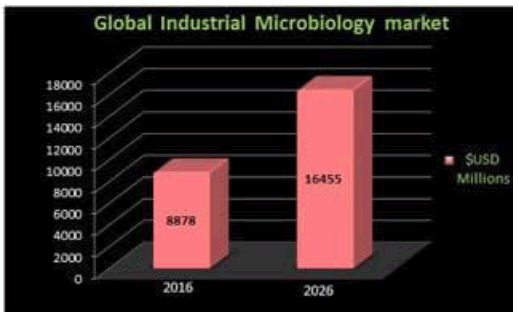
The clinical microbiology market has been influenced by the COVID-19 pandemic. Manufacturing and supply chain hurdles confront the field, including timely delivery of goods to end-users and meeting inconsistent demand for the sector's products and services.Furthermore, a limited availability of skilled lab professionals to conduct/study diagnostic tests, limited operations in most industries, completely inadequate funding for research and academic institutes, the temporary closure of major academic institutes, a disrupted supply chain, and challenges in providing essential/post-sales services due to lockdowns have all caused a drop in clinical microbiology product supply.
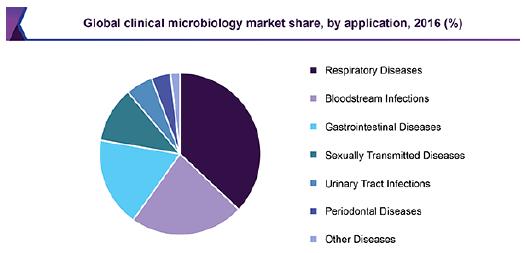
The global DNA sequencing market is projected to reach USD 85.5 Million by 2025 from USD 310.1 Million in 2017 growing at a CAGR of 8.5% during the forecast period. The global market for Food Microbiology reached nearly $7.1 billion in 2017. This market is expected to grow to nearly $9.6 billion in 2017 and $15.7 billion by 2025, with a compound annual growth rate (CAGR) of 8.1% from 2017 to 2025.
Product
Based on technology, the industry is segmented into tissue engineering and regeneration, fermentation, PCR, nanotechnology, chromatography, DNA sequencing and cell based assay. In 2021, the tissue engineering and regeneration segment accounted for highest revenue and was valued at over USD 11.3 billion. However, the nanotechnology, fermentation and cell based assay segments will experience lucrative growth owing to rising R&D initiatives by various biotechnological and pharmaceutical companies.
The global microbiology market is valued at $6,727.29 million in 2014 and is expected to grow at a CAGR of 13.03% between 2014 and 2021. Increasing disease burden of infectious diseases and increased funding for healthcare expenditure are the important growth drivers for this market during the forecast period. The pharmaceuticals application segment accounted for the largest share of the microbiology market in 2014, while the food application segment is expected grow at the highest CAGR between 2014 and 2021 in the global microbiology market.
Market Overview
Billion in 2020, the market is expected to increase at a compound annual growth rate (CAGR) of 6.8% from 2020 to 2027, reaching a revised size of US$6.2 billion. Instruments, one of the report's segments, is expected to grow at a CAGR of 6.4 percent and reach US$2.5 billion by the conclusion of the research period.Following an eye examination of the pandemic's commercial repercussions and the resulting economic crisis, the Reagents & Kits segment's growth is revised to a revised 7.4% CAGR for the life of the agreement.
The economy in the United States is supposed to be worth $1.1 billion, while China is expected to grow at a rate of 10.4 percent each year - In the United States, the market for rapid microbiology testing is estimated at us$1.1 billion by 2020. China, the world ’s second - largest economy, is anticipated to raise a projected market size of US$1.3 billion by 2027, with a CAGR of 10.3 percent between 2020 and 2027.Japan and Canada are two additional significant geographic markets, with forecasted growth rates of 3.7 percent and 6.2 percent, respectively, from 2020 to 2027. Germany is expected to develop at a CAGR of around 4.4 percent in Europe.
Industry Insights
The global microbiology market size was valued at USD 9.1 billion in 2016 and is expected to develop at a CAGR of 6.7% over the forecast period. Constantly rising incidence of infectious diseases is driving market growth. Infectious diseases are primarily diagnosed using clinical tests. According to the Centres for Disease Control and Prevention (CDC), around 9,421 new cases of tuberculosis, 51,455 new cases of salmonella, 33,461 new cases of Lyme disease, and 433 new cases of meningococcal disease were registered in U.S. in 2021
Similarly, according to the American Cancer Society, around 1,688,780 new cases of cancer were diagnosed in U.S. in 2017. Thus, high prevalence of diseases where clinical tests are used as one of the major diagnostic tools is expected to augment market growth in future. Sudden outbreaks of Ebola, Zika and other contagious pathogens are also contributing to rising prevalence of infectious diseases. As per an article published in the Journal of Clinical Microbiology, there is a shortage of trained and skilled professionals in medical and microbiological laboratories for processing and interpreting samples and specimens. Moreover, there has been a steep decline in the number of medical laboratory training programs and students graduating from such programs in U.S.
Report Coverage & Deliverables
• Competitive benchmarking
• Market forecasts
• Company market shares
• Market opportunities
• Latest trends & dynamics
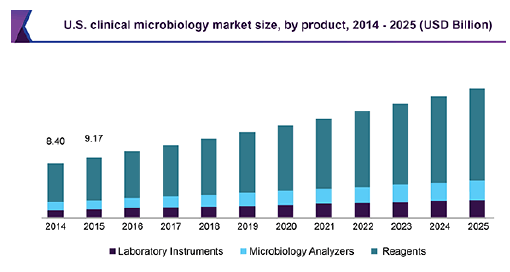
Product Insights
Reagents accounted for the largest revenue share in the global microbiology market. The segment includes products such as solutions, primers, master mixes, and kits used in various diagnostic assays. Reagents currently captures the largest revenue share, with more than 60% attributed to repeat purchase driven by need for new set of reagents for new tests.
The segment is expected to remain dominant throughout the forecast period. Factors such as higher cost of specialized kits and constant repeat purchase are expected to drive the segment over the forecast period. The market is witnessing rising. Investments in research and development (R&D). Almost all analytical and therapeutic research projects demand reagents and chemicals, thereby driving penetration of reagents..
Application Insights
Increasing levels of air pollution with growing industrialization is resulting in rapid escalation in prevalence of respiratory diseases. Also, among all infections, respiratory diseases spread rapidly owing to easy transfer of contagious pathogens. Thus, the segment is expected to show significant growth over the forecast period. Furthermore, prevalence of infectious diseases is high in developed as well as developing countries.
The 6th Clinical Microbiology Conference hosted by the Conferenceseries LLC Group was held duringOctober 20-22, 2016 Rome, Italy with the theme “One Health: To attain optimal health for people, animals and the environment".with topics exploring risks and best practices in infectious disease.
The Conference was accomplished by the support of top microbial experts, diagnostic therapists, physicians, bacteriologists, laboratory scientists, industry researchers, scholars, decision makers, public health professionals and other health care professionals around the world and exchanged ideas on new therapeutic approaches, recommendations and latest clinical data. The meeting was carried out through various sessions, in which the discussions were held on the following major scientific tracks:
Microbial Pathogenesis
Nosocomial Infections
Epidemiology
Parasitic Diseases
Disease Diagnosis and Prevention
Fungal Diseases
Viral Infections
Antimicrobial Agents
Bacterial diseases
Dynamics and consequences of antimicrobial resistance
Microbial Biochemistry
Infection Control
Infectious diseases
Health Science
Medical Microbiology
Host Pathogen Interactions
Antimicrobials and Chemotherapy
Immunity and Vaccination
Microbial Biofilms
Conferenceseries LLC Group International would like to convey a warm gratitude to all the Honourable guests and Keynote Speakers of Clinical Microbiology 2016:
Clinical Microbiology-2016 Organizing Committee would like to thank Moderators of the conference
Clinical Microbiology-2016 was moderated by Dr. Rossella Colomba Lelli, Istituto Zooprofilattico Sperimentale dell’Abruzzo e del Molise “G. Caporale”, Italy
We are thankful to our below Honourable guests and Keynote Speakers for their generous support and suggestions.
Amy C Sims - University of North Carolina at Chapel Hill, USA
Giulio Tarro – T. & L. de Beaumont Bonelli for cancer research, Italy
Daniela Maria Cirillo - San Raffaele Scientific Institute Milan, Italy
Claudio Galli - Abbott Diagnostics, Italy
Nicholas Bergman - National Bioforensic Analysis Center, USA
Nicola Petrosillo – National Institute for Infectious Diseases, Italy
Maria Rita Castrucci - WHO National Influenza Centre, Italy
The conference proceedings were carried out through various Scientific-sessions and plenary lectures, of which the following topics were highlighted as Keynote-presentations:
The small molecule nucleoside prodrug GS-5734 exhibits broad antiviral activity against pathogenic human coronaviruses and related zoonotic strains : Amy C Sims, University of North Carolina at Chapel Hill, USA
Human vaccines for infectious and non-infectious diseases: Giulio Tarro, T. & L. de Beaumont Bonelli for cancer research, Italy
Turning WGS-based diagnostics into practice for diagnosis of drug resistant tuberculosis : Daniela Maria Cirillo , San Raffaele Scientific Institute Milan, Italy
New insights in the diagnosis and monitoring of HCV infection : Claudio Galli, Abbott Diagnostics, Italy
Genomics-based bioforensic analysis at the national bioforensic analysis center: Nicholas Bergman, National Bioforensic Analysis Center, USA
Clostridium difficile infection in the healthcare setting : Nicola Petrosillo, National Institute for Infectious Diseases, Italy
Virological surveillance of the continuously evolving influenza viruses : Maria Rita Castrucci, WHO National Influenza Centre, Italy
International also took the privilege of felicitating Clinical Microbiology-2016, Chair and Co-Chairs whose support made conference a great success.
Various sessions were chaired and co chaired by:
Maurizio Provenzano, University Hospital Zurich, Switzerland, Fiona McPhee, Bristol-Myers Squibb Co, USA, Gianfranco Donelli, Microbial Biofilm Laboratory, Italy, Charles William Keevil, University of Southampton Centre for Biological Sciences, UK, Margitta Dathe, Leibniz Institute of Molecular Pharmacology, Germany, Charles William Keevil, University of Southampton Centre for Biological Sciences, UK, Margitta Dathe, Leibniz Institute of Molecular Pharmacology, Germany, Zhiheng Pei, New York University School of Medicine, USA, Liying Yang, New York University School of Medicine, USA, Wolfgang R.Heizmann, University of Tübingen, Germany, Amaresh Das, APHIS-USDA, USA
Our Best Poster Presentation is:
Title: Bovine mastitis: Staphylococci and resistance genes towards β-lactams and macrolides-lincosamides antibiotics in Argentina, Mariela E rednik, University of Buenos Aires, Argentina
Title: Antibacterial Activity of N-Styryl alkylimidazolium Ionic Liquids, Luis Guzman J, Universidad de Talca, Chile
Our special thanks to the editors of Clinical Microbiology: Open Access, Journal of Microbial and Biochemical Technology, Journal of Medical Microbiology & Diagnosisand the organizing committee members, Chair and Co-Chairs for their immense support and beneficial approach.
The conference proceedings were carried out through various Scientific-sessions and plenary lectures.
ConferenceSeries LLC Group Conferences is glad to announce “8th Clinical Microbiology Conference” scheduled from October 26-27, 2017 Paris, France, the only meeting in the field that offers you the rare opportunity to explore the complete spectrum of microbiology - from basic science to translational and clinical application.
Clinical Microbiology-2017 is guaranteed to offer something best of interest. Bookmark your dates now.
For more details: http://clinicalmicrobiology.conferenceseries.com/
Visa application Documents
For conference attendance and participation only Business Visa should be applied. Contact your nearest travel agent/visa information center/ Amsterdam, Netherlands Embassy for the correct application form.
All visas for visiting / Amsterdam, Netherlands shall be processed by respective authorities only upon submission of proper documents through proper channel.
In case of non-furnishing of documents, non-adherence to guidelines visas shall be cancelled by respective authorities.
The minimum supportive documents that might be required while applying for / Amsterdam, Netherlands visa include:
Letter of invitation,
Abstract acceptance letter (if speaker),
Registration payment receipt,
Accommodation confirmation letter issued under conference letter head.
For letter of invitation and accommodation confirmation, payment of registration fees and accommodation charges is a pre-requisite.
Visa application Documents
For conference attendance and participation only Business Visa should be applied. Contact your nearest travel agent/visa information center/ Amsterdam, Netherlands Embassy for the correct application form.
All visas for visiting / Amsterdam, Netherlands shall be processed by respective authorities only upon submission of proper documents through proper channel.
In case of non-furnishing of documents, non-adherence to guidelines visas shall be cancelled by respective authorities.
The minimum supportive documents that might be required while applying for / Amsterdam, Netherlands visa include:
Letter of invitation,
Abstract acceptance letter (if speaker),
Registration payment receipt,
Accommodation confirmation letter issued under conference letter head.
For letter of invitation and accommodation confirmation, payment of registration fees and accommodation charges is a pre-requisite.
Participation Options and Benefits
PARTICIPATION OPTIONS: MICROBIOLOGY CONGRESS 2021, provides the participants with different modes or ways to participate such as Delegate or Speaker under either ACADEMIC / STUDENT / BUSINESS Category.
-
Keynote speaker: 45-50 minutes
-
Speaker (oral presentation): 25-30 minutes (only one person can present)
-
Speaker (workshop): 45-50 minutes (more than 1 can present)
-
Speaker (special session): 45-50 minutes (more than 1 can present)
-
Speaker (symposium): more than 45 minutes (more than 1 can present)
-
Delegate(only registration): will have access to all the sessions with all the benefits of registration
-
Poster presenter: can present a poster and enjoy the benefits of delegate
-
Remote attendance: can participate via video presentation or e-poster presentation
-
Exhibitor: can exhibit his/her company’s products by booking exhibitor booths of different sizes
-
Media partner
-
Sponsor
-
Collaborator
For more details about each mode, kindly contact: mailto:microbiology@meetingsemail.com
Conference Highlights
- Antimicrobials
- Medical Microbiology
- Microbial Enzymes
- Microbial Biofilms
- Marine Microbiology
- Public Health Microbiology and Emerging Infectious Diseases
- Pharmaceutical Microbiology
- Antimicrobial Agents and Infectious diseases
- Agricultural Microbiology
- Infection and Immunity
- Pathogenicity of Microbes
- Microbiology Research and Advancements
- Microbiomes
- Biotechnology & Synthetic Biology
- Environmental Microbiology
- Microbiology major Research thematic areas
To share your views and research, please click here to register for the Conference.
To Collaborate Scientific Professionals around the World
| Conference Date | November 08-09, 2021 | ||
| Sponsors & Exhibitors |
|
||
| Speaker Opportunity Closed | Day 1 | ||
| Poster Opportunity Closed | Click Here to View | ||
Useful Links
Special Issues
All accepted abstracts will be published in respective Our International Journals.
Abstracts will be provided with Digital Object Identifier by




